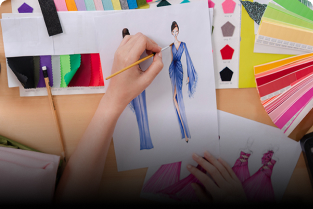Fashion design is one of the most creative and competitive industries in the world. Behind every stunning outfit on the runway lies a designer with not just artistic talent, but also discipline, vision, and business sense.
If you dream of becoming a successful fashion designer, it’s not just about sketching pretty clothes — it’s about developing the right qualities that help you stand out in this dynamic field. Let’s explore the key traits every fashion designer should cultivate.
1. Creativity and Imagination
Fashion design starts with creativity. A designer must have a strong sense of imagination to visualize new styles, patterns, and trends that others might not see.
Whether you’re inspired by nature, culture, or modern art, your ability to turn ideas into wearable art is what makes your work unique. The more you explore your creative side, the more innovative your designs become.
2. Attention to Detail
Fashion is all about the little things — the stitching, the fabric texture, the color contrast, or even the placement of buttons. A great designer pays attention to every detail to ensure their work looks polished and professional.
Even a small mistake can change how a garment feels or fits, so precision is essential in every step of the process.
3. Strong Sense of Aesthetics
A designer’s sense of style and color harmony defines their identity. Understanding which colors, fabrics, and silhouettes work together is crucial for creating balanced, appealing designs.
A good aesthetic sense helps you design outfits that are not just trendy but timeless.
4. Good Communication Skills
Fashion design is a team effort. Designers work closely with tailors, models, marketers, and clients. You must be able to communicate your vision clearly, whether it’s explaining a sketch to a seamstress or presenting your collection to buyers.
Strong communication also helps in collaboration and networking — two things that can open major doors in the fashion world.
5. Technical Skills
Creativity needs to be supported by technical knowledge. A fashion designer should be skilled in:
-
Sketching and illustration
-
Pattern making and draping
-
Fabric knowledge
-
Sewing techniques
-
Digital design software like Adobe Illustrator or CLO 3D
These skills help bring your creative ideas to life with accuracy and professionalism.
6. Awareness of Trends
Fashion changes fast — what’s in style today might not be tomorrow. Successful designers stay updated on the latest trends, consumer preferences, and market demands.
This doesn’t mean copying others; it means understanding what’s popular and using it as inspiration to create something fresh and exciting.
7. Perseverance and Hard Work
Behind the glamour of fashion shows lies months of hard work, sleepless nights, and endless revisions. The industry can be demanding, so resilience and determination are key.
The best designers never give up, even when faced with criticism or rejection — they keep refining their craft and pushing boundaries.
8. Business and Marketing Knowledge
Fashion isn’t just art — it’s also business. To succeed, designers must understand pricing, branding, and promotion. Knowing how to market your collection, manage clients, and position your brand helps you grow from a creative artist to a successful entrepreneur.
9. Adaptability
The fashion industry is constantly evolving with new technologies, fabrics, and styles. Designers who adapt to change — whether it’s digital fashion, sustainable materials, or AI-driven design — will thrive in the modern era.
Being flexible and open to learning keeps your skills relevant and your designs fresh.
10. Confidence and Self-Belief
Finally, confidence is what ties all these qualities together. Every designer has their own unique voice and style — believe in yours. Confidence helps you share your ideas boldly, take creative risks, and handle criticism constructively.
Conclusion
Fashion design is more than creating clothes — it’s about expressing ideas, emotions, and culture through design. To succeed, you need a blend of creativity, discipline, technical expertise, and confidence.

